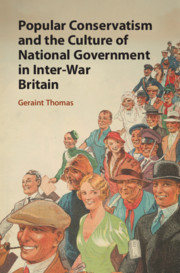Book contents
- Popular Conservatism and the Culture of National Government in Inter-War Britain
- Popular Conservatism and the Culture of National Government in Inter-War Britain
- Copyright page
- Contents
- Figures and Tables
- Acknowledgements
- Abbreviations
- 1 The National Government and Interwar Conservatism: The Historical Task
- Part I Rethinking Interwar Conservatism
- Part II Popular Conservatism and the National Government
- 4 Anti-Socialism and Working-Class Conservatism in the Industrial North
- 5 The Politics of Anti-Socialism in the Suburbs
- 6 Modernity and Paternalism in Rural Politics
- 7 National Conservatism in Scotland and Wales
- Part III Reputations of Government
- Appendix Parties’ Share of the Vote in the Constituency Case-Study Areas, 1918–1945
- Bibliography
- Index
5 - The Politics of Anti-Socialism in the Suburbs
from Part II - Popular Conservatism and the National Government
Published online by Cambridge University Press: 28 November 2020
- Popular Conservatism and the Culture of National Government in Inter-War Britain
- Popular Conservatism and the Culture of National Government in Inter-War Britain
- Copyright page
- Contents
- Figures and Tables
- Acknowledgements
- Abbreviations
- 1 The National Government and Interwar Conservatism: The Historical Task
- Part I Rethinking Interwar Conservatism
- Part II Popular Conservatism and the National Government
- 4 Anti-Socialism and Working-Class Conservatism in the Industrial North
- 5 The Politics of Anti-Socialism in the Suburbs
- 6 Modernity and Paternalism in Rural Politics
- 7 National Conservatism in Scotland and Wales
- Part III Reputations of Government
- Appendix Parties’ Share of the Vote in the Constituency Case-Study Areas, 1918–1945
- Bibliography
- Index
Summary
Drawing upon the case studies of Ilford, Epping, Birmingham Moseley and Liverpool East Toxteth, this chapter explores the relationship between the National Government and popular Conservatism in suburban, predominantly middle-class constituencies. In the 1920s, as chapter 2 argued, suburban Conservatives rejected Baldwin’s attempts to appeal to voters along apolitical lines and instead urged a robust party stance; however, their own struggle to rehabilitate the conspicuous partisanship that had characterised the civic culture of Edwardian Conservatism – and which they interpreted as apathy among ‘known’ local Conservatives - led many activists to doubt the future prospects of Conservatism in the face of Labour competition. Chapter 5 argues that 1931 proved a turning point. The experience of the general election of that year initiated Conservative activists to the advantages of articulating a non-party variety of anti-socialism that matched the cross-party makeup of the National Government. It also encouraged them to cultivate an ostensibly non-party presence in the associational life of the suburbs, including in the new housing estates. Yet, as the chapter demonstrates, the National Government continued to challenge the suburban Conservative activist in some ways: National anti-socialism could be as much a source of competition as cooperation between local Conservatives and Liberals, and the government’s policy of Indian constitutional reform antagonised elements within the party. Even so, by 1935, the Conservatives’ suburban grassroots, so often the voice of diehard Conservatism, remained wedded to the National Government and looked enthusiastically to Baldwin as both the embodiment and facilitator of its ‘national’ appeal.
Keywords
- Type
- Chapter
- Information
- Publisher: Cambridge University PressPrint publication year: 2020



